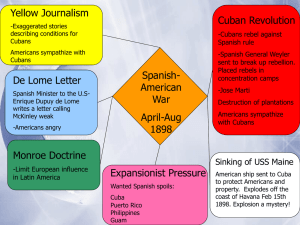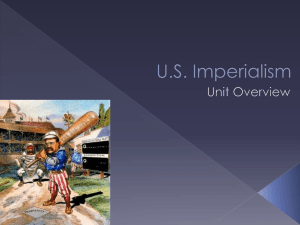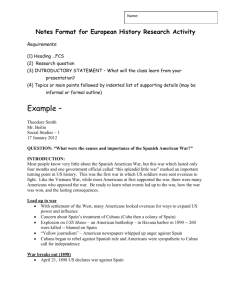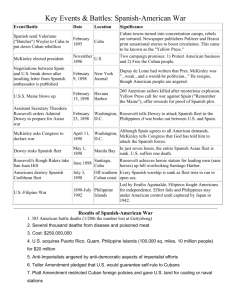ARS_Spanish American War - Utah Teaching with Primary
advertisement
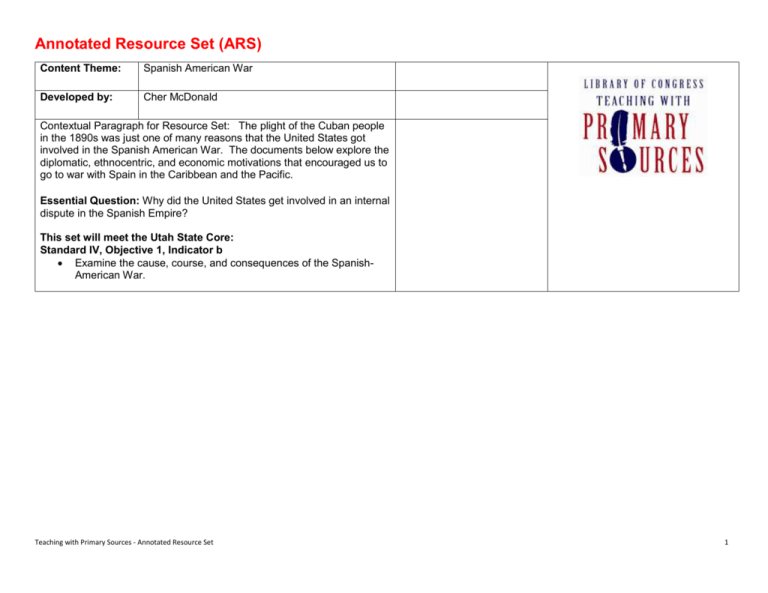
Annotated Resource Set (ARS) Content Theme: Spanish American War Developed by: Cher McDonald Contextual Paragraph for Resource Set: The plight of the Cuban people in the 1890s was just one of many reasons that the United States got involved in the Spanish American War. The documents below explore the diplomatic, ethnocentric, and economic motivations that encouraged us to go to war with Spain in the Caribbean and the Pacific. Essential Question: Why did the United States get involved in an internal dispute in the Spanish Empire? This set will meet the Utah State Core: Standard IV, Objective 1, Indicator b Examine the cause, course, and consequences of the SpanishAmerican War. Teaching with Primary Sources - Annotated Resource Set 1 Resource Set Spanish American War De Lôme Letter (1898) This letter, written by the Spanish Ambassador to the United States, Enrique Dupuy de Lôme, criticized American President William McKinley by calling him weak and concerned only with gaining the favor of the crowd. Publication of the letter helped generate public support for a war with Spain over the issue of independence for the Spanish colony of Cuba. The United States Declares War on Spain, 1898. A friend of President McKinley recounts the effect of the explosion of the US Maine on the President. A United States Army surgeon attending wounded soldiers in a field hospital during the SpanishAmerican war. The Red Cross emblem appears on the sleeve of one man. CREATED/PUBLI SHED 1898? "Off to War" Parade in Denver / photo by Harry M. Rhoads. Spectators watch a military parade in front of the City Hall building located on 14th (Fourteenth) and Market Streets, in Denver, Colorado. The parade was to honor soldiers leaving for the Spanish American War in 1898. "Remember the 'Maine'". Written by Arthur H. MacOwen for the occasion of the benefit performance given at the Academy of Music, Philadelphia, on Friday, March 11th, 1898, in aid of the survivors from the blowing up of the U. S. S. 'Maine" in the harbor of Havana on February 15th, 1898. Distant Possessions - The Parting of the Ways by Andrew Carnegie The North American Review Volume 0167 Issue 501 (August 1898) http://memory.loc.gov/ service/pnp/fsa/8e020 00/8e02200/8e02252r.j pg http://photoswest.org/cg ibin/imager?00185235+ Rh-235 http://memory.loc.gov/rbc/rb pe/rbpe16/rbpe160/1600410 0/001dq.gif http://digital.library.corne ll.edu/cgi/t/text/textidx?c=nora;cc=nora;idno =nora01672;view=toc;node=nora01 67-2:10 This is the main page and the article is titled- Distant Possessions - The Parting of the Ways No digital image http://www.ourdocume nts.gov/document_dat a/document_images/d oc_053_big.jpg Transcript: http://www.ourdocume nts.gov/doc.php?doc= 53&page=transcript http://www.eyewitn esstohistory.com/s panishwar.htm Notes/Comments: Teaching with Primary Sources - Annotated Resource Set 2 Annotations Grade Level Curriculum Connections Curriculum Standards Learning Objectives Content Objectives 11th US History Utah State Core: Standard IV, Objective 1, Indicator b Reading Writing Inquiry Examine the growing demand for the United States to enter a war with Spain in 1898. Develop language through viewing media.; make inferences and draw conclusions Students will write informational text evaluating information and interpreting ideas. Use process of inquiry to deepen understanding. Teaching with Primary Sources - Annotated Resource Set Students will use primary sources to help them understand how the United States committed to fight a war with Spain. Students will compare the reasons for going to war. Suggested Learning Strategies Suggested Assessment Strategies Links to Other Resources 1. Students will use the Analysis tool: Students will use the Analysis tool for documents: http://www.archives.g ov/education/lessons/ worksheets/written_do cument_analysis_wor ksheet.pdf and for pictures: http://www.archives.g ov/education/lessons/ worksheets/photo_an alysis_worksheet.pdf Students should be given a chronology of the Spanish American War. As they work around the room in stations they need to fill in the relevant details from the primary sources. There should be four stations (you can have duplicates for room flow if needed) at each station the students read the speeches (or analyze photos/songs) and then fill in pertinent details on a timeline. When the class is done you can debrief the class with a general discussion. Poetry interpreta tion of the White Man’s Burden: http://hist orymatter s.gmu.ed u/d/6609/ Thinking Objectives Students will be able to analyze primary sources to increase their content knowledge of the Spanish American War. Students will read and comprehend original documents written during the historical period. Students will draw conclusions from examining primary documents. 2. Students will use documents to determine the role of popular sentiment in declarations of war. 3. Students will use images to see how the United States rallied around the Spanish American War. This discussion has relevance for today as well; you can talk about the War in Iraq and WMD as another relevant incident, or talk about Vietnam and the Gulf of Tonkin. All three are discussions about public perception of a threat. Written response to the question: “ Why did the United States get involved in an internal dispute in the Spanish Empire ” Library of Congress collection of Span Am War movies: http://me mory.loc. gov/amm em/sawht ml/sawho me.html Spanish American War 3
